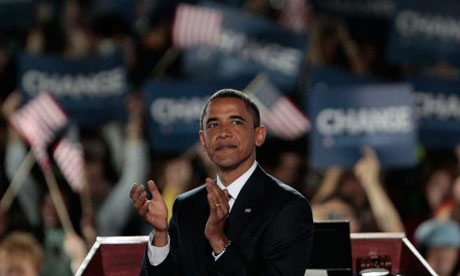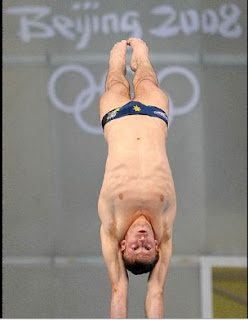Now let there be no doubt. The Republican nominee, John McCain, has worn the uniform of our country with bravery and distinction, and for that we owe him our gratitude and respect. And next week, we'll also hear about those occasions when he's broken with his party as evidence that he can deliver the change that we need.
But the record's clear: John McCain has voted with George Bush 90% of the time. Senator McCain likes to talk about judgment, but really, what does it say about your judgment when you think George Bush has been right more than 90% of the time? I don't know about you, but I'm not ready to take a 10% chance on change.
The truth is, on issue after issue that would make a difference in your lives - on healthcare and education and the economy - Senator McCain has been anything but independent. He said that our economy has made "great progress" under this president. He said that the fundamentals of the economy are strong. And when one of his chief advisers - the man who wrote his economic plan - was talking about the anxiety Americans are feeling, he said that we were just suffering from a "mental recession," and that we've become, and I quote, "a nation of whiners".
A nation of whiners? Tell that to the proud auto workers at a Michigan plant who, after they found out it was closing, kept showing up every day and working as hard as ever, because they knew there were people who counted on the brakes that they made. Tell that to the military families who shoulder their burdens silently as they watch their loved ones leave for their third or fourth or fifth tour of duty. These are not whiners. They work hard and give back and keep going without complaint. These are the Americans that I know.
Now, I don't believe that Senator McCain doesn't care what's going on in the lives of Americans. I just think he doesn't know. Why else would he define middle class as someone making under $5m a year? How else could he propose hundreds of billions in tax breaks for big corporations and oil companies but not one penny of tax relief to more than 100 million Americans? How else could he offer a healthcare plan that would actually tax people's benefits, or an education plan that would do nothing to help families pay for college, or a plan that would privatise social security and gamble your retirement?
It's not because John McCain doesn't care. It's because John McCain doesn't get it.
For over two decades, he's subscribed to that old, discredited Republican philosophy - give more and more to those with the most and hope that prosperity trickles down to everyone else. In Washington, they call this the ownership society, but what it really means is - you're on your own. Out of work? Tough luck. No healthcare? The market will fix it. Born into poverty? Pull yourself up by your own bootstraps - even if you don't have boots. You're on your own.
Well it's time for them to own their failure. It's time for us to change America.
If John McCain wants to have a debate about who has the temperament, and judgment, to serve as the next commander-in-chief, that's a debate I'm ready to have.
For while Senator McCain was turning his sights to Iraq just days after 9/11, I stood up and opposed this war, knowing that it would distract us from the real threats we face. When John McCain said we could just "muddle through" in Afghanistan, I argued for more resources and more troops to finish the fight against the terrorists who actually attacked us on 9/11, and made clear that we must take out Osama bin Laden and his lieutenants if we have them in our sights. John McCain likes to say that he'll follow bin Laden to the gates of hell - but he won't even go to the cave where he lives.
And today, as my call for a time frame to remove our troops from Iraq has been echoed by the Iraqi government, and even the Bush administration, even after we learned that Iraq has a $79bn surplus while we're wallowing in deficits, John McCain stands alone in his stubborn refusal to end a misguided war.
That's not the judgment we need. That won't keep America safe. We need a president who can face the threats of the future, not keep grasping at the ideas of the past.
You don't defeat a terrorist network that operates in 80 countries by occupying Iraq. You don't protect Israel and deter Iran just by talking tough in Washington. You can't truly stand up for Georgia when you've strained our oldest alliances. If John McCain wants to follow George Bush with more tough talk and bad strategy, that is his choice - but it is not the change we need.
We are the party of Roosevelt. We are the party of Kennedy. So don't tell me that Democrats won't defend this country. Don't tell me that Democrats won't keep us safe. The Bush-McCain foreign policy has squandered the legacy that generations of Americans - Democrats and Republicans - have built, and we are here to restore that legacy.
As commander-in-chief, I will never hesitate to defend this nation, but I will only send our troops into harm's way with a clear mission and a sacred commitment to give them the equipment they need in battle and the care and benefits they deserve when they come home.
I will end this war in Iraq responsibly, and finish the fight against al-Qaida and the Taliban in Afghanistan. I will rebuild our military to meet future conflicts. But I will also renew the tough, direct diplomacy that can prevent Iran from obtaining nuclear weapons and curb Russian aggression. I will build new partnerships to defeat the threats of the 21st century: terrorism and nuclear proliferation; poverty and genocide; climate change and disease. And I will restore our moral standing, so that America is once again that last, best hope for all who are called to the cause of freedom, who long for lives of peace and who yearn for a better future.
We Democrats have a very different measure of what constitutes progress in this country.
We measure progress by how many people can find a job that pays the mortgage; whether you can put a little extra money away at the end of each month so you can someday watch your child receive her college diploma. We measure progress in the 23m new jobs that were created when Bill Clinton was president - when the average American family saw its income go up $7,500 instead of down $2,000 like it has under George Bush.
We measure the strength of our economy not by the number of billionaires we have or the profits of the Fortune 500, but by whether someone with a good idea can take a risk and start a new business, or whether the waitress who lives on tips can take a day off to look after a sick kid without losing her job - an economy that honours the dignity of work.
The fundamentals we use to measure economic strength are whether we are living up to that fundamental promise that has made this country great - a promise that is the only reason I am standing here tonight.
Change means a tax code that doesn't reward the lobbyists who wrote it, but the American workers and small businesses who deserve it.
Unlike John McCain, I will stop giving tax breaks to corporations that ship jobs overseas, and I will start giving them to companies that create good jobs right here in America.
I will eliminate capital gains taxes for the small businesses and the start-ups that will create the high-wage, high-tech jobs of tomorrow.
I will cut taxes - cut taxes - for 95% of all working families. Because in an economy like this, the last thing we should do is raise taxes on the middle class.
On fuel
For the sake of our economy, our security, and the future of our planet, I will set a clear goal as president: in 10 years, we will finally end our dependence on oil from the Middle East.
Washington's been talking about our oil addiction for the last 30 years, and John McCain has been there for 26 of them. In that time, he's said no to higher fuel-efficiency standards for cars, no to investments in renewable energy, no to renewable fuels. And today, we import triple the amount of oil as the day that Senator McCain took office.
Now is the time to end this addiction, and to understand that drilling is a stop-gap measure, not a long-term solution. Not even close.
As president, I will tap our natural gas reserves, invest in clean coal technology and find ways to safely harness nuclear power. I'll help our auto companies retool, so that the fuel-efficient cars of the future are built right here in America. I'll make it easier for the American people to afford these new cars. And I'll invest $150bn over the next decade in affordable, renewable sources of energy - wind power and solar power and the next generation of biofuels; an investment that will lead to new industries and 5m new jobs that pay well and can't ever be outsourced.
Now is the time to finally meet our moral obligation to provide every child a world-class education, because it will take nothing less to compete in the global economy. Michelle and I are only here tonight because we were given a chance at an education. And I will not settle for an America where some kids don't have that chance. I'll invest in early childhood education. I'll recruit an army of new teachers, and pay them higher salaries and give them more support. And in exchange, I'll ask for higher standards and more accountability. And we will keep our promise to every young American - if you commit to serving your community or your country, we will make sure you can afford a college education.
Now is the time to finally keep the promise of affordable, accessible healthcare for every single American. If you have healthcare, my plan will lower your premiums. If you don't, you'll be able to get the same kind of coverage that members of Congress give themselves. And as someone who watched my mother argue with insurance companies while she lay in bed dying of cancer, I will make certain those companies stop discriminating against those who are sick and need care the most.
Now is the time to help families with paid sick days and better family leave, because nobody in America should have to choose between keeping their jobs and caring for a sick child or ailing parent.
Now is the time to change our bankruptcy laws, so that your pensions are protected ahead of CEO bonuses; and the time to protect social security for future generations.
We may not agree on abortion, but surely we can agree on reducing the number of unwanted pregnancies in this country.
On gun control
The reality of gun ownership may be different for hunters in rural Ohio than for those plagued by gang violence in Cleveland, but don't tell me we can't uphold the second amendment while keeping AK-47s out of the hands of criminals.
On same-sex marriages
I know there are differences on same-sex marriage, but surely we can agree that our gay and lesbian brothers and sisters deserve to visit the person they love in the hospital and to live lives free of discrimination.
On immigration
Passions fly on immigration, but I don't know anyone who benefits when a mother is separated from her infant child or an employer undercuts American wages by hiring illegal workers. This too is part of America's promise - the promise of a democracy where we can find the strength and grace to bridge divides and unite in common effort.
On individual responsibility
We must also admit that fulfilling America's promise will require more than just money. It will require a renewed sense of responsibility from each of us to recover what John F Kennedy called our "intellectual and moral strength". Yes, government must lead on energy independence, but each of us must do our part to make our homes and businesses more efficient. Yes, we must provide more ladders to success for young men who fall into lives of crime and despair. But we must also admit that programmes alone can't replace parents; that government can't turn off the television and make a child do her homework; that fathers must take more responsibility for providing the love and guidance their children need.
Individual responsibility and mutual responsibility - that's the essence of America's promise.
On equal pay
And now is the time to keep the promise of equal pay for an equal day's work, because I want my daughters to have exactly the same opportunities as your sons.
What I will not do is suggest that the senator [McCain] takes his positions for political purposes. Because one of the things that we have to change in our politics is the idea that people cannot disagree without challenging each other's character and patriotism.
The times are too serious, the stakes are too high for this same partisan playbook. So let us agree that patriotism has no party. I love this country, and so do you, and so does John McCain. The men and women who serve in our battlefields may be Democrats and Republicans and Independents, but they have fought together and bled together and some died together under the same proud flag. They have not served a Red America or a Blue America - they have served the United States of America.
So I've got news for you, John McCain. We all put our country first.
In the faces of those young veterans who come back from Iraq and Afghanistan, I see my grandfather, who signed up after Pearl Harbour, marched in Patton's army, and was rewarded by a grateful nation with the chance to go to college on the GI Bill.
In the face of that young student who sleeps just three hours before working the night shift, I think about my mum, who raised my sister and me on her own while she worked and earned her degree; who once turned to food stamps but was still able to send us to the best schools in the country with the help of student loans and scholarships.
When I listen to another worker tell me that his factory has shut down, I remember all those men and women on the south side of Chicago who I stood by and fought for two decades ago after the local steel plant closed.
And when I hear a woman talk about the difficulties of starting her own business, I think about my grandmother, who worked her way up from the secretarial pool to middle management, despite years of being passed over for promotions because she was a woman. She's the one who taught me about hard work. She's the one who put off buying a new car or a new dress for herself so that I could have a better life. She poured everything she had into me. And although she can no longer travel, I know that she's watching tonight, and that tonight is her night as well.
I don't know what kind of lives John McCain thinks that celebrities lead, but this has been mine. These are my heroes. Theirs are the stories that shaped me. And it is on their behalf that I intend to win this election and keep our promise alive as president of the United States.
On change
I realise that I am not the likeliest candidate for this office. I don't fit the typical pedigree, and I haven't spent my career in the halls of Washington.
But I stand before you tonight because all across America something is stirring. What the naysayers don't understand is that this election has never been about me. It's been about you.
For 18 long months, you have stood up, one by one, and said enough to the politics of the past. You understand that in this election, the greatest risk we can take is to try the same old politics with the same old players and expect a different result. You have shown what history teaches us - that at defining moments like this one, the change we need doesn't come from Washington. Change comes to Washington. Change happens because the American people demand it - because they rise up and insist on new ideas and new leadership, a new politics for a new time.
America, this is one of those moments.
On the American spirit
This country of ours has more wealth than any nation, but that's not what makes us rich. We have the most powerful military on Earth, but that's not what makes us strong. Our universities and our culture are the envy of the world, but that's not what keeps the world coming to our shores.
Instead, it is that American spirit - that American promise - that pushes us forward even when the path is uncertain; that binds us together in spite of our differences; that makes us fix our eye not on what is seen, but what is unseen, that better place around the bend.
Source:
The Guardian






